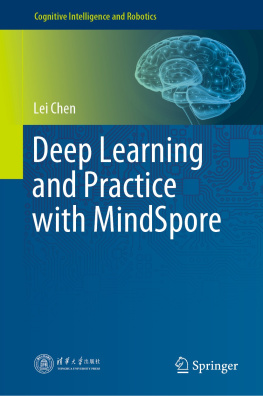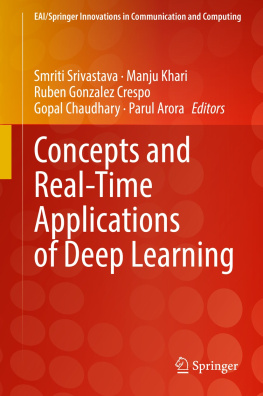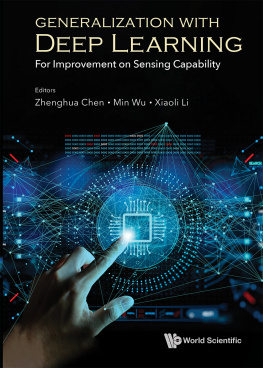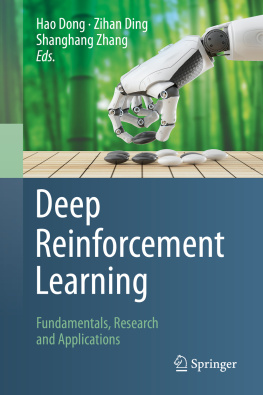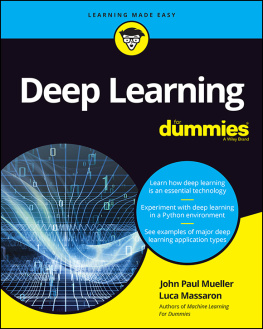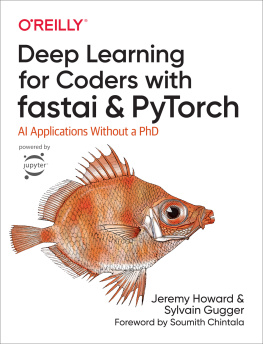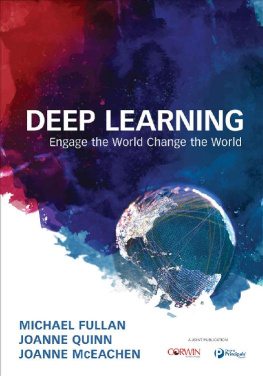Lei Chen - Deep Learning and Practice with MindSpore
Here you can read online Lei Chen - Deep Learning and Practice with MindSpore full text of the book (entire story) in english for free. Download pdf and epub, get meaning, cover and reviews about this ebook. year: 2021, publisher: Springer Singapore, genre: Romance novel. Description of the work, (preface) as well as reviews are available. Best literature library LitArk.com created for fans of good reading and offers a wide selection of genres:
Romance novel
Science fiction
Adventure
Detective
Science
History
Home and family
Prose
Art
Politics
Computer
Non-fiction
Religion
Business
Children
Humor
Choose a favorite category and find really read worthwhile books. Enjoy immersion in the world of imagination, feel the emotions of the characters or learn something new for yourself, make an fascinating discovery.
- Book:Deep Learning and Practice with MindSpore
- Author:
- Publisher:Springer Singapore
- Genre:
- Year:2021
- Rating:5 / 5
- Favourites:Add to favourites
- Your mark:
- 100
- 1
- 2
- 3
- 4
- 5
Deep Learning and Practice with MindSpore: summary, description and annotation
We offer to read an annotation, description, summary or preface (depends on what the author of the book "Deep Learning and Practice with MindSpore" wrote himself). If you haven't found the necessary information about the book — write in the comments, we will try to find it.
Lei Chen: author's other books
Who wrote Deep Learning and Practice with MindSpore? Find out the surname, the name of the author of the book and a list of all author's works by series.
Deep Learning and Practice with MindSpore — read online for free the complete book (whole text) full work
Below is the text of the book, divided by pages. System saving the place of the last page read, allows you to conveniently read the book "Deep Learning and Practice with MindSpore" online for free, without having to search again every time where you left off. Put a bookmark, and you can go to the page where you finished reading at any time.
Font size:
Interval:
Bookmark:
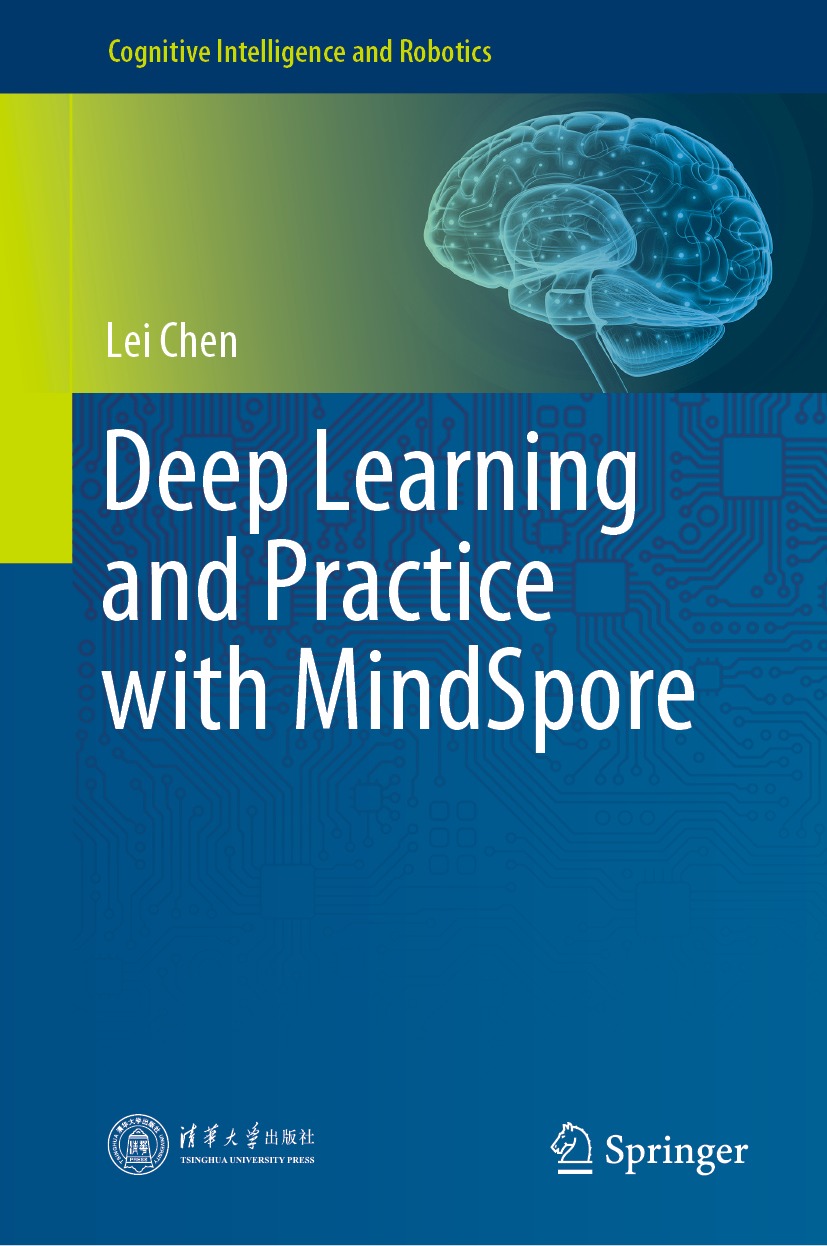
Cognitive Intelligence refers to the natural intelligence of humans and animals, it is considered that the brain performs intelligent activities. While establishing a hard boundary that distinguishes intelligent activities from others remains controversial, most common behaviors and activities of living organisms that cannot be fully synthesized using artificial means are regarded as intelligent. Thus the acts of sensing and perception, understanding the environment, and voluntary control of muscles, which can be performed by lower-level mammals, are indeed intelligent. Besides the above, advanced mammals can perform more sophisticated cognitive tasks, including logical reasoning, learning, recognition, and complex planning and coordination, none of which can yet be realized artificially to the level of a baby, and thus are regarded as cognitively intelligent.
This book series covers two important aspects of brain science. First, it attempts to uncover the mystery behind the biological basis of cognition, with a special emphasis on the decoding of stimulated brain signals or images. Topics in this area include the neural basis of sensory perception, motor control, sensory-motor coordination, and understanding the biological basis of higher-level cognition, including memory, learning, reasoning, and complex planning. The second objective of the series is to publish consolidated research on brain-inspired models of learning, perception, memory, and coordination, including results that can be realized on robots, enabling them to mimic the cognitive activities performed by living creatures. These brain-inspired models of machine intelligence complement the behavioral counterparts studied in traditional artificial intelligence.
The series publishes textbooks, monographs, and contributed volumes.
More information about this series at http://www.springer.com/series/15488


Jointly published with Tsinghua University Press
The print edition is not for sale in China (Mainland). Customers from China (Mainland) please order the print book from: Tsinghua University Press.
ISBN of the Co-Publishers edition: 9787302546610
Translation from the Chinese Simplified language edition: MindSpore by Lei Chen, and Yunhui Zeng, Tsinghua University Press 2020. Published by Tsinghua University Press. All Rights Reserved.
This Springer imprint is published by the registered company Springer Nature Singapore Pte Ltd.
The registered company address is: 152 Beach Road, #21-01/04 Gateway East, Singapore 189721, Singapore
AI has spread much faster and wider than any other general-purpose technology in history. There is little doubt that this new general-purpose technology will have a profound impact on every aspect of the economy and society. However, different industries and organizations have adopted AI at different rates: Traditional industries are still in the initial stages of adoption, whereas the Internet industry embraced it from the beginning. Although most industries are already using AI to some extent, they have not witnessed the expected changes, meaning that there is still huge room for improvement. Some industries have still not found an effective way to realize the value of AI.
In general, there are three main reasons for this. First, the development of AI applications and solutions is challenging, requiring an expert skill set that millions of IT engineers have yet to acquire. Second, unlike the Internet, which has a relatively simple environment, AI applications have complex operating environments and must adapt to meet a diverse range of requirements. For example, the various cloud, edge computing, and terminal device scenarios have different requirements, and AI applications must not only collaborate with existing production systems in various industries and related processes, but also integrate with traditional IT applications. Third, the diversity and complexity of applications in various industries bring new requirements, such as robustness, security, and interpretability, for AI algorithms and theories. AI has therefore undergone rapid, continuous improvement and adaptation, creating a range of challenges for new entrants wanting to master AI technologies.
Central to Huaweis AI strategy is the continuous investment in full-stack, all-scenario AI solutions with the aim of accelerating AI development. To this end, Huawei released its full-stack, all-scenario AI solution in October 2018, and officially unveiled MindSporean all-scenario AI computing frameworkin August 2019. Many people have asked why Huawei launched MindSpore despite there being many other frameworks available. The main considerations for investing in MindSpore at that time were as follows. First, no existing framework was able to support all scenarios seamlessly. Because Huawei services cover device, edge, and cloud scenarios, and privacy protection is becoming increasingly important, we need a computing framework that supports all scenarios to empower all-round AI. Second, we have learned from Huaweis AI applications and research over the past few years that the development of AI computing frameworks is far from converging. Exploratory research into technologies such as AI acceleration for just-in-time compilation (which is used in automatic differentiation and tensor calculation) and automatic parallelization for ultra-large neural networks, as well as new research areas such as deep probabilistic programming and graph neural networks, require further development of AI computing frameworks.
Font size:
Interval:
Bookmark:
Similar books «Deep Learning and Practice with MindSpore»
Look at similar books to Deep Learning and Practice with MindSpore. We have selected literature similar in name and meaning in the hope of providing readers with more options to find new, interesting, not yet read works.
Discussion, reviews of the book Deep Learning and Practice with MindSpore and just readers' own opinions. Leave your comments, write what you think about the work, its meaning or the main characters. Specify what exactly you liked and what you didn't like, and why you think so.

